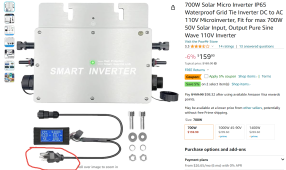celer
New Member
What would you imagine needs to happen to allow people to utilize solar safely with the grid without having to deal with all of the current regulatory challenges with permitting - lowering the bar so much that someone who is not technical could walk into a home improvement store, buy a solar panel and plug it into their house and start generating power.
Why isn't there a standard & regulations for plugging in ~ 1500w of power to the grid today? What would this standard & regulations need to look like?
My guess is
The closest thing I've found is the ConnectDER, which is a meter you can easily plug solar into, but it's not something someone non-technical could just plug stuff into safely.
Why isn't there a standard & regulations for plugging in ~ 1500w of power to the grid today? What would this standard & regulations need to look like?
My guess is
- Specialized outlet designed for plugging in renewable energy limited to 1500w of 120AC - so it carries the same risks as using an extension cord with a 1500w AC heater.
- The solar panel/inverter combo, since it generates energy needs to have its own breaker integrated into it, and ground wire to provide safety.
- The electric company has to provide a net metering capable meter
- I think this needs to be a dedicated circuit with a single plug for generating energy, so the supply side can't overload it.
The closest thing I've found is the ConnectDER, which is a meter you can easily plug solar into, but it's not something someone non-technical could just plug stuff into safely.




